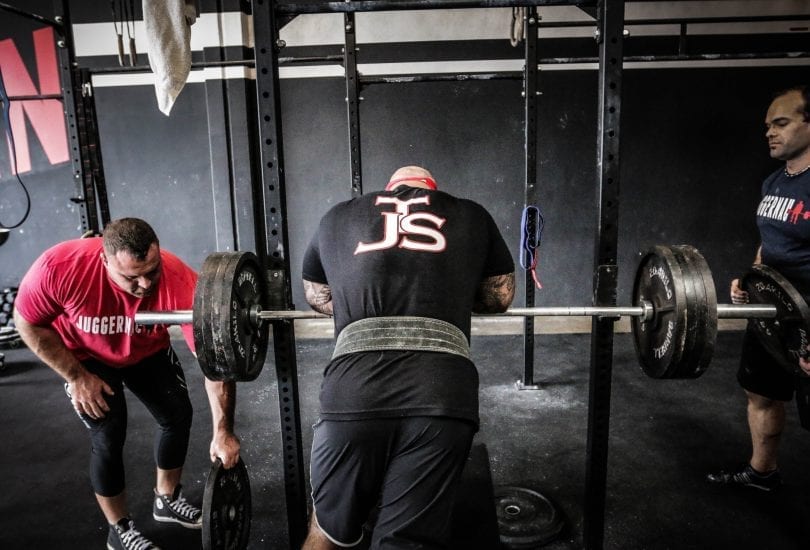Written by Mike Mastell
Of late I have noticed an increased concentration on nutrition in the strength sports community. A lot of guys aren’t buying into the “mass moves mass” ideology anymore, and we’re seeing some real freaks in the lighter classes. Guys are moving some serious weights only to stand at the top of the podium with a set of abs, and I think it’s a phenomenal trend. Along with the interest in the market, of course, there comes interest from the other end: the sellers of the product. So there has also been a huge increase in nutrition coaches looking to provide a product to these athletes. And I must say there are a ton of top notch scientists coming out and providing some really great information from their own studies and also interpreting this information for the general public. I am seeing a Dispelling the Myths of Nutrition article put out at least once a week and it’s knocking down the latest fad diet and non-science based trend. All of these things are great!
BUT there needs to be a balance. The problem is there are a bunch of highly educated individuals, most of whom are lab rats, working with the general public. I’ve talked to them before, and have seen the faces on people around us contorting at the mention of gluconeogenesis and pyruvate.
Here lies part of the problem. The general public, and most of their audience, does not understand what exactly it is that they are writing about. Sure, it’s great when an article is published that shows how medium molecular mass carbohydrates are better for intra-workout supplementation than monosaccharides in terms of sustained energy release. Or that post workout carbs with L-Leucine rather than protein have the biggest effect on insulin release to increase nutrient transport and protein synthesis and muscle recovery. All of these things are fantastic. However there’s one big drawback: their audience does not understand half of what they’re reading. So naturally they go to the individual coach saying “Take my money, and just tell me what to do.” I get emails like this all the time, and it’s just not that simple. I know it’s not that simple because I’ve seen plenty of people get a meal plan and fall off the band wagon after 2 weeks because it’s not for them. It does not matter in the least if the diet is the most beautiful scientifically synergistic program ever written because compliance trumps science if it allows better adherence so someone can more consistently hit their caloric intake and macronutrient requirements. If someone can’t hit their macro requirements regularly, is it a bad diet? You bet it is!
Compliance is ignored more often than not, and it is probably at the fault of the industry. A lot of these guys are working with high level athletes that will do anything and everything they tell them to. So on the occasion that somebody legitimately cannot follow the program the excuse is, “Well if you wanted it bad enough you will find a way to make it happen.” So the person is left to believe that it is their fault that they are unable to succeed.
Scenario 1
During my initial interview with the person I will ask how their schedule allows for them to eat. If the client responds by telling me that they are extremely busy in and out of meetings all day, my first thought is “okay, how can I accommodate their schedule to make this program doable for them?” Setting them up with 5-6 isocaloric meals probably won’t be very smart; they would be set up for failure. So instead, setting them up with a calorie dense shake for breakfast that they could drink on the way to work while sitting in traffic is a good step. Then, a small snack with some nuts and a shake midday while they are in meetings, a big lunch during their break , another small shake late afternoon and then a huge dinner when they finally get home. This way they can eat a bunch of meals on the fly to meet their macros, they’re not starving all day long during work where they would be likely to pick on stuff and they can get in a lot of high quality solid food during their two larger meals.
Scenario 2
I speak to a client that is looking to lose weight and they note that something that has been a struggle for them in the past has been eating sweet foods in moderation. This would be a situation where setting them up with a flexible dieting plan would be doomed from the start. This would be the type of situation where the person might need to have every meal of the week planned for them. All week long they simply refer to the program and follow exactly what’s on there. Give them a meal a week where they can get their fix in, and then it’s right back to the plan. This way they can get through the week knowing that as long as they adhere during the week they can loosen up. Then it’s right back to the plan again.
Scenario 3
I get this one a lot. I’ll be speaking with an overweight individual that in their words “eats pretty clean.” Ok, while it’s good that they eat pretty clean all week long they are obviously eating far too much. They aren’t having a problem with eating extremely calorie dense foods, they’re just eating too much of those damned “super foods” everybody reads about on the internet. In this circumstance IIFYM (If It Fits Your Macros) would be perfect; they already know what to eat, but they are having issues figuring out moderation. Equal meals throughout the day would be perfect so that they can get a real gauge on portion control to train them for long term success.
Scenario 4
This is one that I get quite a bit as well. They eat well all day long but they stopped eating after 6PM because that’s what they read in a magazine once and they’re doing what every other self-respecting fitness enthusiast is doing. However, they’re starving by 8 o’clock and they start snacking…. and that entire day of dieting gets washed away. So a better situation might be to close down their eating window. Have them start off the day fasting. By doing this and pushing their first meal back by 3-4 hours you can now bump back the eating window 2-3 hours. Instead of eating from 7am-6pm they can now eat from 11am-8pm. Additionally, if you set them up to eat say 30-40% of their daily caloric intake before 4 o’clock they can eat the remainder between 4pm and 8pm. By putting a large amount of their food later in the day they will be so stuffed they won’t have room left to snack. This simple style of backloading works for them. The science shows that in a day, caloric intake is the thing that matters most so if this style of manipulating caloric intake allows them to follow the guidelines, then this works best.
Scenario 5
The individual tells you that they want to get shredded, but they don’t handle carbs well at all. Well, you know in this instance they likely need some carbs to make the best of the best gains possible, however they have already fixed themselves to the outcome by saying they don’t want carbs. So what do you do?
Figure out the correct number of calories they need for their daily activity and nix the carbs. Throw them in twice a week in a bolus load effort near the heaviest workouts they have. This way they won’t be depleted all day long and the placebo effect of their thoughts on low carbs will help them achieve their goals. Then to address their fear of carbs, slowly transition the carbs back in by making isocaloric substitutions. You can explain that by increasing them slowly and independent of caloric intake, this will allow them to sustain the fat burning benefits without the (supposed) negative effects the have seen in the past from carb intake. If a person does not believe a diet will work for them, it won’t. I’ve seen the same thing happen from the opposite spectrum from guys and girls where they are convinced that if they are not eating carbs throughout the day that cannot possibly perform during their training sessions.
It is absolutely essential that the coach is able to work with the client and get a feel for the client’s needs. My plea to the coaches out there that might fit this hyper scientific description is to think about it in terms of pharmaceutical prescription. If a patient will not comply with a drug because of the administration procedure, isn’t the drug essentially put on the back burner? This is the same thing happening to the “perfect diet” that someone can’t adhere to. Get a feel for your client and become a master of compliance, because once you can figure out the best way to get that individual to follow your program to a T by making a few compromises, you just figured out what’s best for that individual.






